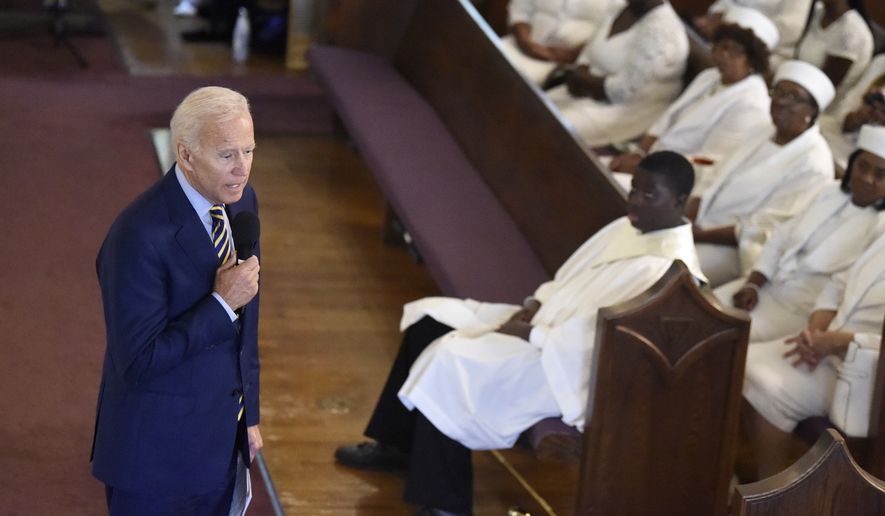It may have seemed a snub at the time, but one political observer says when former Vice President Joseph R. Biden was denied Holy Communion at a Catholic church in South Carolina last weekend, it may have been intentional.
Matthew Green, a political scientist at Catholic University, said Mr. Biden could have chosen to attend a church where the priest had known views about abortion and those receiving communion.
“Maybe a calculation was made that this could help Biden get some attention in a crowded primary race and maybe gin up support among the growing number of Americans who are either non-believers or non-church attendees,” Mr. Green said.
The Rev. Robert E. Morey, the pastor at St. Anthony Catholic Church in Florence, revealed he denied communion to the Democratic presidential hopeful because it would have been wrong to give the church’s imprimatur to someone so publicly out of step on the church’s pro-life teachings.
“Holy Communion signifies we are one with God, each other and the Church. Our actions should reflect that,” Father Morey told the Florence Morning News. “Any public figure who advocates for abortion places himself or herself outside of Church teaching.”
Mr. Biden has refused to confirm or deny the snub, saying, “I’m a practicing Catholic. I practice my faith.”
But the incident has put the focus back on the longtime politician’s record, where he says he is personally pro-life but backs pro-choice policies as a public official.
“I think that decision for Biden has consequences for the general election that I think aren’t as appreciated as much as they should be,” said Christopher Budzisz, political science professor at Loras College, a Catholic school in Dubuque, Iowa. “In the general election, it makes it easier to attack him as being part and parcel of the left when it comes to reproductive rights.”
That could prove awkward for Mr. Biden, who held a town hall event Wednesday at Loras College. His 2020 message portrays his middle-class upbringing in hardscrabble Scranton, Pa., as letting him relate to the white working-class voters across the Rust Belt who abandoned the party in 2016.
Mr. Budzisz said Mr. Biden may suffer particularly for his evolution to the left on the issue of abortion, including saying he now opposes the Hyde Amendment, a decades-old policy, which he used to back, that prohibits taxpayer money from being used to pay for most abortions.
Mr. Biden has shifted on that issue as pro-choice forces grow stronger within the Democratic primary electorate.
“I think that winning the white working-class votes is essential for Democrats. But it won’t be won or lost based on communion” but rather on abortion-related policies, Mr. Budzisz said.
For its part, the Catholic Church has struggled with how to handle liberal politicians such as Mr. Biden who deviate from the church’s teachings, in part because the idea of withholding communion has polarized the people in the pews.
“I think it is hard to escape the partisan dimension of this,” Mr. Budzisz said. “Conservative Republican Catholics will probably think it is good they are doing that, but Democratic Catholics would probably say this is not appropriate.”
“For many people, the partisan has trumped their religious identity,” he said. “So how they perceive the event is often shaped by the partisan identity more than their understanding of the sacrament.”
Some Catholic bishops took a more aggressive stand in 2004 when they came out against Sen. John Kerry of Massachusetts, who went on to win the Democratic presidential nomination, receiving communion because of his support for abortion and stem cell research.
“I can’t take my Catholic belief, my article of faith, and legislate it on a Protestant or a Jew or an atheist,” Mr. Kerry said at the time. “We have separation of church and state in the United States of America.” It was the same message that former President John F. Kennedy, still the only Catholic president in U.S. history, delivered to overcome concerns about his religion in 1960.
In 2004 though, Mr. Kerry lost the Catholic vote by 5 percentage points to then-President George W. Bush in the general election, according to exit polls.
Former President Barack Obama, meanwhile, won Catholics by 9 points in 2008 and 2 points points in 2012, President Trump flipped the script in 2016, carrying members of America’s largest church by 4 percentage points.
Joshua Kaplan, professor of political science at Notre Dame University, said there is a chance the decision to bar Mr. Biden from communion generates sympathy for his beliefs.
“What the church is doing does run the risk of creating some backlash where a Catholic voter might be thinking, ’I am not a big fan of Joe Biden, but I am uncomfortable with what the church is doing,’ ” he said.
Christopher Borick, director of the Muhlenberg College Institute of Public Opinion, said that he is certain that Mr. Biden anticipated these sorts of situations would come up during the campaign.
“I don’t know if he was intentional in picking this place, but he knows this is going to be part of the campaign moving forward,” Mr. Borick said. “I don’t think he is looking to win a lot of conservative Catholic votes, but the Catholic vote is very varied.”
“How he is treated by certain groups in the church might actually endear him to some others, especially more progressive Catholics and some that might be in the lapsed category who think ’This is one of those reasons I don’t like the church,’ ” he said.
• Seth McLaughlin can be reached at smclaughlin@washingtontimes.com.




Please read our comment policy before commenting.